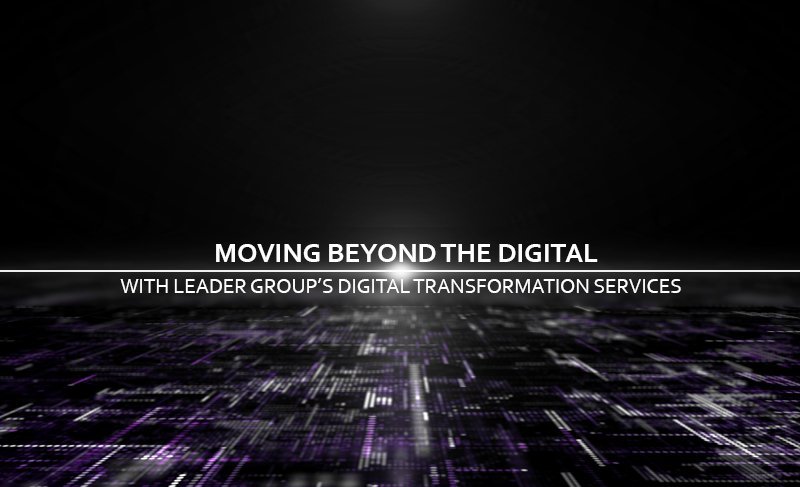
Moving Beyond the Digital with Leader Group’s Digital Transformation Services
“The digital transformation services are not only about transforming business processes but also about empowering people to work in new ways.” Digitizing the businesses with Leader Group’s pragmatic approach reaps unparalleled benefits.”
Digitization of business processes refers to using the available raw data and converting it into digital formats.
Digitization of business processes makes the entire workflow easier, accessible, and smoother.
Since the COVID-19 pandemic has emerged; Industry 4.0, or the Digital Revolution, has prevailed in the market, making businesses adapt to digital technologies more than ever.
Talks of digitizing the business processes have been the talk of the market for a few decades. Investing in digital tools remains one of the topmost priorities among businesses.
However, businesses across the sectors are still susceptible to investing in digital practices.
Furthermore, achieving a business resilient stakeholder engagement and a digital business environment remains one of the topmost priorities amongst businesses.
Challenges To Complete Digitization:
Just like the opportunities that digitization of business processes offers; it also presents businesses with many challenges that are harder to manage if not taken effectively.
Lack of Expertise:
Digitization is a process that is expert-centric.
Old traditional methods of collecting the data, analyzing it, and deriving insights from it to make business decisions are no longer in usage as far as the business processes are concerned.
New challenges need new solutions. Hence, digitalization considers significant data usage that fetches the desired results.
But the lack of expertise causes the businesses to suffer as it fails to leverage the opportunities it offers.
Lack Of Active Participation:
Many businesses have been able to navigate the pandemic’s challenges. Still, some companies struggle due to a lack of robust participation from their stakeholders.
Achieving a business initiative tends to become difficult without active participation from the stakeholders, right from the clients to the C-level executives.
Improper User Experience:
As digital practices have emerged, the user experience, too, has turned into a digital user experience.
Many businesses view technology as a medium to save money and reduce unnecessary spending.
While the data gets analyzed, the lack of proper digital tools results in a satisfying user experience.
Digitization of Business Practices – Beyond the Digital:
Digitization of business processes is one of the cost-cutting measures by businesses.
Furthermore, the prevalence of digitized business practices has also resulted in rising concerns for data security and cybersecurity.
Hence, cybersecurity practices are on the rise in the new digitized world.
With the surge in remote work, many industries have recognized the importance of increasing cybersecurity spending.
According to a recent survey, almost 55% of respondents reported shifting to digitally-driven business practices, whereas 20% of respondents reported that 20% of organizations have already adopted digitized business practices.
With the rise in revenues forcing budgets to shrink, the significance of cybersecurity has become a priority for companies across industries.
However, Leader Group’s pragmatic approach to digital transformation is not only limited to an organization, but the gamut of three critical factors, people, process, and technology.
Digital Transformation Services – Approach:
Leader Group’s digital technologies aim to create new or modify existing business processes, culture, and customer experiences to meet changing business and market requirements.
Leader Group brings in deep, efficient functional expertise known for its holistic perspective that drives engagement through efficient and professional consultation.
Its digital transformation addresses all the pre-requisites while ensuring an effective digitally transformed business environment.
It enables the digital organization and focuses on achieving digital customer experience, effectively enhancing digital transformation services.
Furthermore, Leader’s digital transformation consultation entails a digital technology strategy.
It leverages data, business analytics, and systems, which enhances digital transformation progress and enables digitally-driven business services.
Apart from these primary requirements and pre-requisites, Leader’s Group’s digital transformation approach also focuses on government compliance and policies such as complying with GRC (governance, risk, and compliance) policies.
GRC (governance, risk, and compliance) is a management strategy that manages an organization’s overall governance, enterprise risk management, and regulatory compliance. Leader Group protects organizations’ brands, reputations, and customers from regulatory or security breaches.
Since the benefits of digitized business practices are enormous, Leader Group’s one of its kind, pragmatic approaches make the entire digital transformation process excessively easier.
This easier approach promotes digitization and digitalization among corporates with utmost resilience and ease.
Conclusion – Digital Transformation:
Digital transformation is the new normal. With Industry 4.0, digitized business practices have become a way to go for corporates.
Combatting the challenges that implementation of digital transformation services may face, Leader Group ensures a user-friendly approach to digital transformation that focuses on people, process, and technology and drives digitally-driven business practices with utmost ease.





